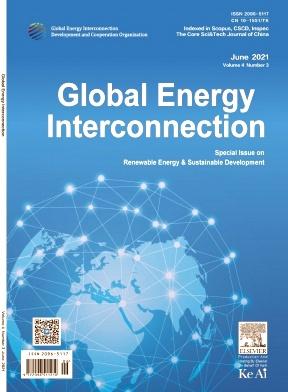Optimal hydrogen-battery energy storage system operation in microgrid with zero-carbon emission
IF 2.6
Q4 ENERGY & FUELS
引用次数: 0
Abstract
To meet the greenhouse gas reduction targets and address the uncertainty introduced by the surging penetration of stochastic renewable energy sources, energy storage systems are being deployed in microgrids. Relying solely on short-term uncertainty forecasts can result in substantial costs when making dispatch decisions for a storage system over an entire day. To mitigate this challenge, an adaptive robust optimization approach tailored for a hybrid hydrogen battery energy storage system (HBESS) operating within a microgrid is proposed, with a focus on efficient state-of-charge (SoC) planning to minimize microgrid expenses. The SoC ranges of the battery energy storage (BES) are determined in the day- ahead stage. Concurrently, the power generated by fuel cells and consumed by electrolysis device are optimized. This is followed by the intraday stage, where BES dispatch decisions are made within a predetermined SoC range to accommodate the uncertainties realized. To address this uncertainty and solve the adaptive optimization problem with integer recourse variables in the intraday stage, we proposed an outer-inner column-and-constraint generation algorithm (outer-inner-CCG). Numerical analyses underscored the high effectiveness and efficiency of the proposed adaptive robust operation model in making decisions for HBESS dispatch.
零碳排放微电网中氢电池储能系统的优化运行
为了实现减少温室气体排放的目标,并解决随机可再生能源激增所带来的不确定性,人们正在微电网中部署储能系统。在对储能系统进行全天调度决策时,仅依靠短期不确定性预测可能会导致大量成本。为了缓解这一挑战,我们提出了一种为在微电网中运行的混合氢电池储能系统(HBESS)量身定制的自适应稳健优化方法,重点关注高效的充电状态(SoC)规划,以最大限度地降低微电网成本。电池储能(BES)的 SoC 范围在日前阶段确定。同时,对燃料电池产生的电能和电解装置消耗的电能进行优化。随后是日内阶段,在这一阶段,BES 调度决策将在预定的 SoC 范围内做出,以适应已实现的不确定性。为了解决这种不确定性,并在日内阶段解决带有整数追索变量的自适应优化问题,我们提出了一种外-内列和约束生成算法(outer-inner-CCG)。数值分析表明,所提出的自适应稳健运行模型在 HBESS 调度决策中具有很高的有效性和效率。
本文章由计算机程序翻译,如有差异,请以英文原文为准。
求助全文
约1分钟内获得全文
求助全文
来源期刊

Global Energy Interconnection
Engineering-Automotive Engineering
CiteScore
5.70
自引率
0.00%
发文量
985
审稿时长
15 weeks
 求助内容:
求助内容: 应助结果提醒方式:
应助结果提醒方式:


